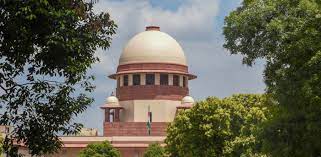
In a significant development, the Supreme Court collegium, headed by Chief Justice of India (CJI) Dhananjaya Y Chandrachud, has recommended the elevation of two high court chief justices as judges of the apex court. The collegium’s decision aims to fill the existing vacancies and strengthen the judicial system. The recommended justices are Ujjal Bhuyan, the chief justice of Telangana High Court, and SV Bhatti, the chief justice of Kerala High Court.
The collegium, comprising justices Sanjay Kishan Kaul, Sanjiv Khanna, BR Gavai, Surya Kant, and CJI Chandrachud, after careful consideration of their merit, integrity, and competence, found Justices Bhuyan and Bhatti deserving and suitable for the esteemed positions in the Supreme Court. A resolution was published, highlighting the collegium’s unanimous decision to propose their names to the Union government for appointment.
Justice Ujjal Bhuyan, hailing from Gauhati High Court, brings a wealth of experience in diverse fields of law, with a specialization in taxation. His profound knowledge and expertise make him a valuable addition to the Supreme Court. On the other hand, Justice SV Bhatti, from Andhra Pradesh High Court, is recognized for his acquired knowledge and experience, along with providing representation to the state.
The Supreme Court currently faces a shortage of three judges, with an upcoming vacancy due to the retirement of Justice Krishna Murari on July 8. The collegium’s recommendations aim to address these vacancies and maintain the strength of the judiciary.
According to sources, the collegium discussed various aspects while finalizing the names, including all-India seniority, regional representation, diversity, and the inclusion of marginalized and backward segments of society. It reflects their commitment to promoting gender diversity and minority representation within the judicial system.
Under the memorandum of procedure (MoP), which governs judicial appointments, the government has the opportunity to raise objections once to the collegium’s recommendations. However, once the names are reiterated, the government is bound by the collegium’s decision. The collegium’s resolution emphasizes the importance of timely processing of appointments to ensure the smooth functioning of the judiciary.
In addition to the elevation of Justices Bhuyan and Bhatti, the collegium also made recommendations for the appointment of chief justices in high courts across the country. This includes the high courts of Bombay, Gujarat, Manipur, and Andhra Pradesh. Prospective recommendations have been made for future vacancies in the high courts of Odisha, Telangana, and Kerala.
Upon the elevation of Justices Bhuyan and Bhatti, the collegium has proposed suitable replacements for their current positions. It includes Justice Sunita Agarwal for the Gujarat High Court, Justice Devendra Kumar Upadhyay for the Bombay High Court, Justice Siddharth Mridul for the Manipur High Court, and Justice DS Thakur for the Andhra Pradesh High Court.
The collegium’s recommendations also consider the transfer of some judges from different high courts, aiming to balance regional representation and optimize judicial expertise across the country.
These proposed appointments and transfers demonstrate the collegium’s commitment to upholding the integrity and effectiveness of the judiciary while ensuring representation, diversity, and merit-based selections. The Union government will now consider the collegium’s recommendations, playing a crucial role in the appointment process.
The elevation of Justices Bhuyan and Bhatti, along with the recommended appointments in various high courts, will contribute to the robust functioning of the judicial system, ensuring justice for all and maintaining the rule of law in the country. It reflects the collegium’s dedication to upholding the principles of justice, merit, and diversity in the Indian judiciary.
Sources By Agencies



